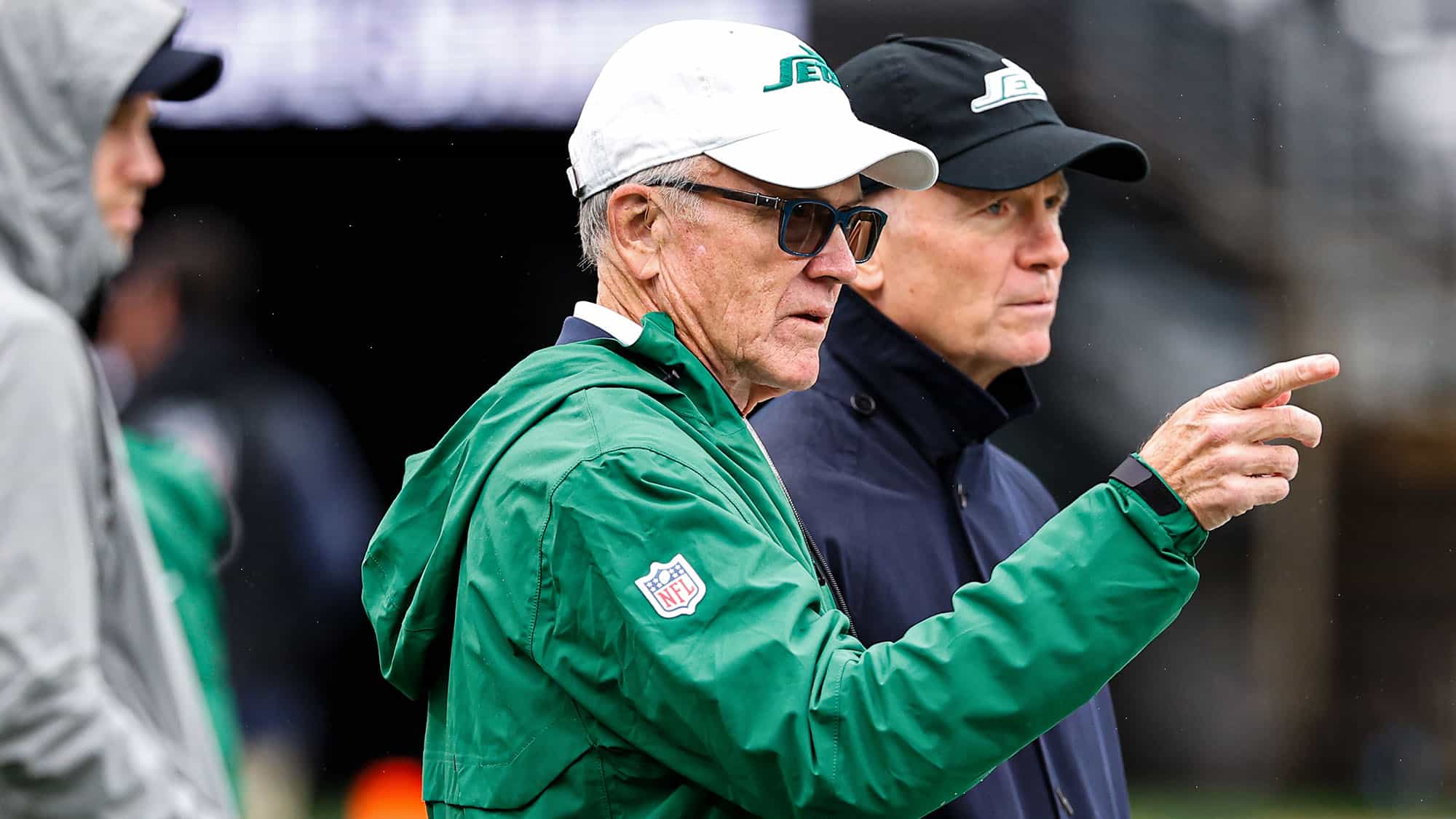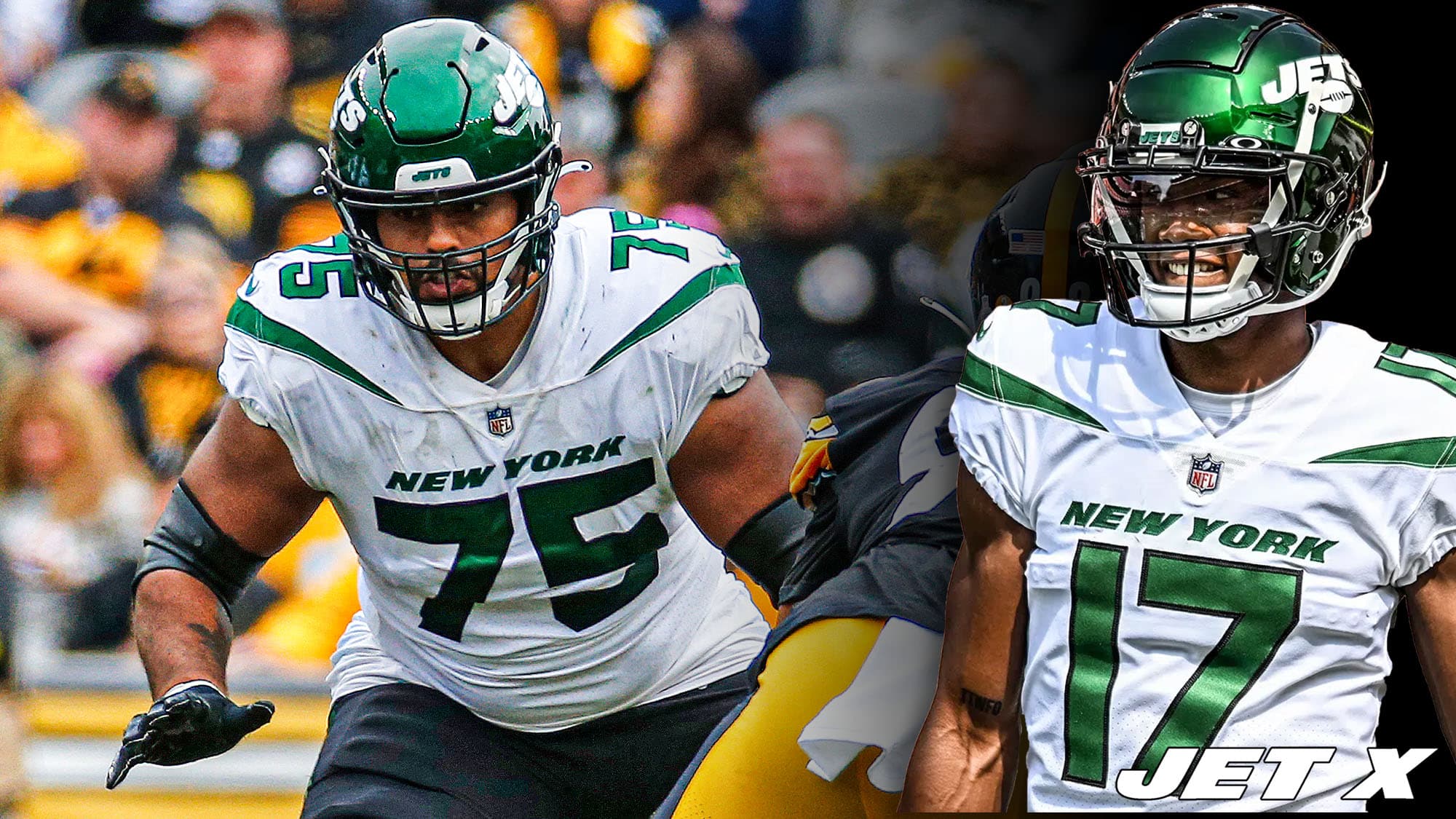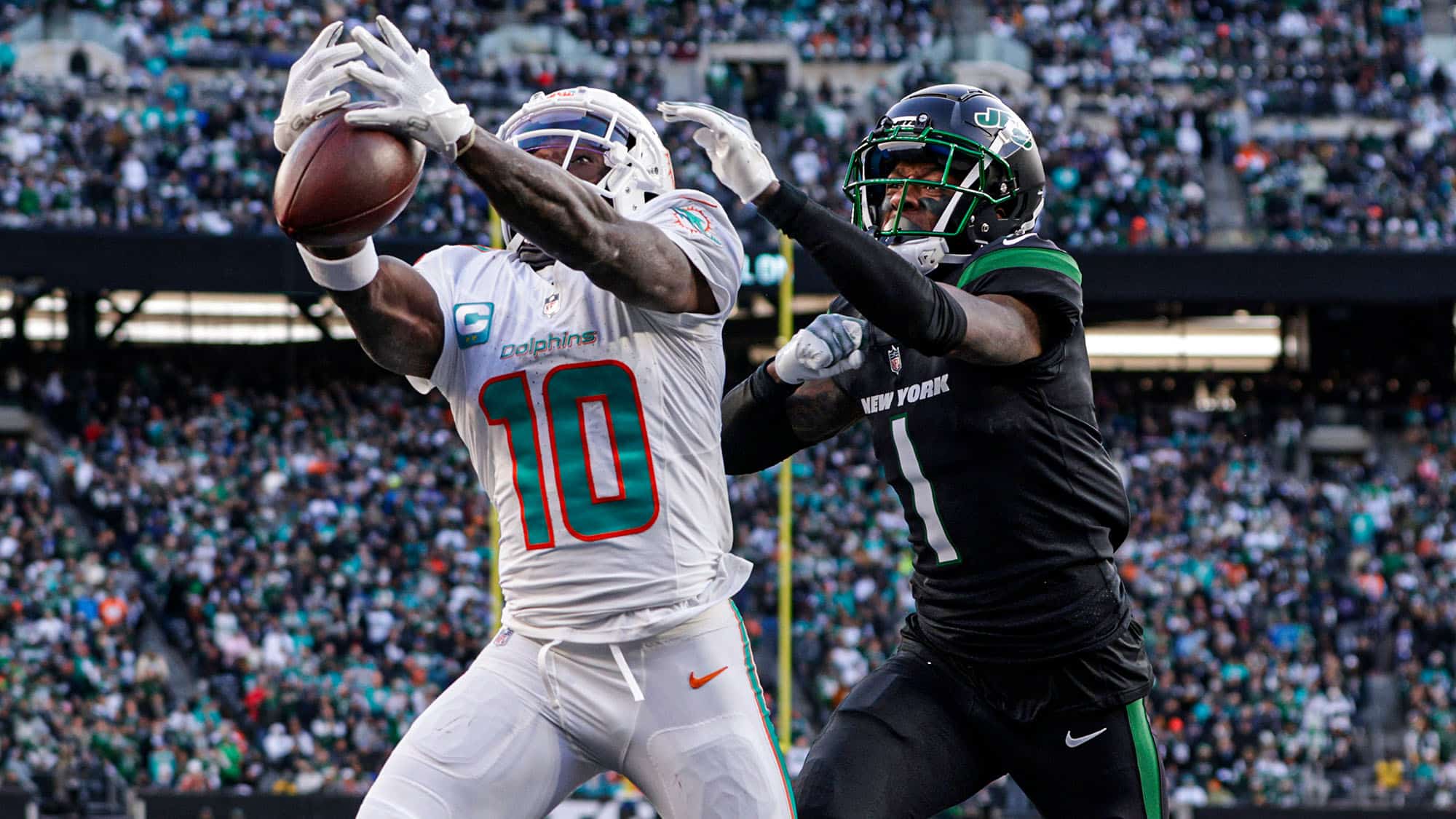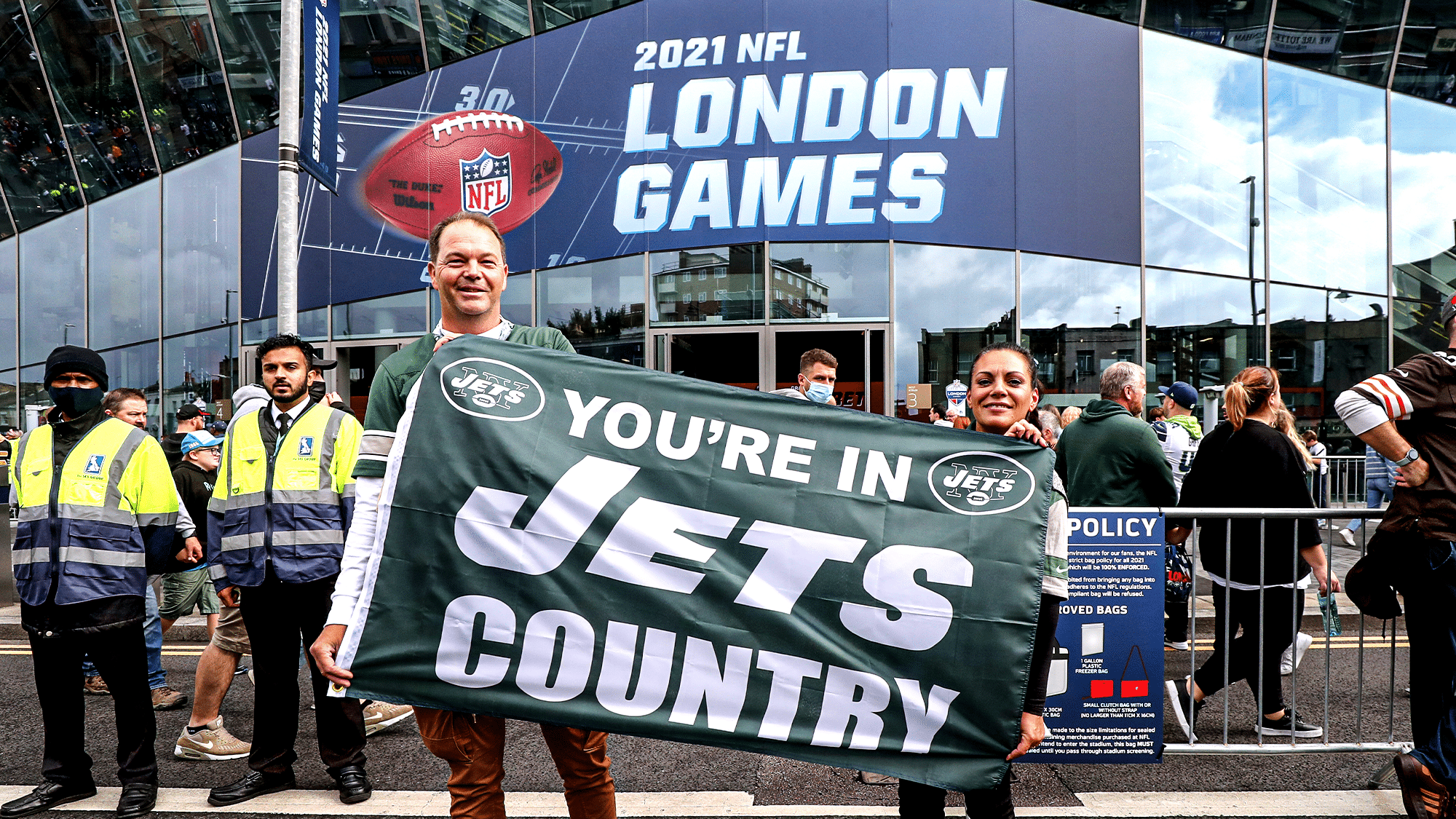Going one-and-done with Haason Reddick is the New York Jets’ best bet
Haason Reddick is coming to the New York Jets on the final year of his three-year, $45 million contract. He will become a free agent in 2025 as he enters his age-31 season.
Some reporters have indicated the Jets are considering signing Reddick to a contract extension. However, in my opinion, the Jets’ wisest play would be to ride it out with Reddick for one year and let him walk in free agency after the season.
Here are a few reasons why.
1. Contract year motivation in a win-now season
The Jets are all in on 2024. They loaded up the roster with 30-plus players whose contracts will expire after the year, including Morgan Moses, Tyron Smith, Mike Williams, and now Reddick.
To ensure they get the most out of Reddick in the 2024 season, letting him play on an expiring contract is a wise idea.
Pro athletes turn it up a notch when they’re playing for a new contract. Reddick will be especially motivated considering he is probably looking at the last multi-year contract of his career in 2025. Not to mention, of all the positions where contract-year motivation could make a difference, defensive linemen are probably at the top. It’s a highly effort-driven position where that extra bit of juice could be the difference between a sack and a missed tackle.
If the Jets reward Reddick with an extension before the season begins, that contract-year motivation disappears. Of course, I’m not suggesting Reddick would mail it in. He was still excellent in non-contract-year seasons over the past few years.
But we’ve seen it plenty of times before: Players go to a different place when there’s money on the line. And in a season where the Jets are focusing on winning the Super Bowl right now, I think it’d be wise to complement that mentality by infusing Reddick with even more incentive to go all-out.
2. Let him walk too early instead of too late
Throughout the Patriots’ dynasty, Bill Belichick famously developed a reputation for letting players walk too early instead of too late. That’s something the Jets have not done well in recent years, but with Reddick, they have a chance to pull it off.
Reddick will be 30 later this year, but he will likely still have a great season in 2024. He remains an elite player. Reddick has an active streak of four consecutive seasons with double-digit sacks, the second-longest active streak in the NFL behind only Myles Garrett. Reddick had 11.0 sacks, 23 quarterback hits, 67 total pressures, and 13 tackles for loss in 2023, making him one of only eight edge rushers in the NFL to reach all those numbers. We haven’t seen significant signs of decline from Reddick just yet.
However, the fall-off is going to come at some point, likely sooner than later. If you’re the Jets, you want to take a page out of Belichick’s book in this situation. Reap the benefits of one great year from Reddick and say goodbye before he inevitably declines in his thirties. Signing Reddick until he’s 32 or 33 years old is a risky proposition. That’s the case for any player, but especially one like Reddick who relies so heavily on his elite speed and agility to be effective.
The Jets should enjoy one year of Reddick while he is still productive and let someone else take the risk that he will continue to be effective as he battles against Father Time. Most importantly, it’s not as if letting him walk would come without a reward for the Jets.
3. Get a compensatory pick to make up for the traded pick
Whether it’s via a trade package or a compensatory pick, the appeal of giving up on a player too early instead of too late is that if you give up on him too early, you at least get something back for him. If you give up on him too late, you just cut him with no returning assets to help you recuperate from the mistake.
In this situation, we’re talking about letting a player walk in free agency, so a compensatory pick is the returning asset. For the Jets, this potential compensatory pick is particularly appealing because it would fall in the same year and in the same range as the pick they gave up to acquire Reddick.
If the Jets let Reddick walk in 2025, they would be in line to get back a compensatory pick in 2026. This would make up for the 2026 third-round pick the Jets gave up to acquire Reddick. Depending on where the compensatory pick falls, the Jets could end up getting one year of Reddick for the equivalent value of a late Day 3 pick.
The Jets will likely part with a 2026 third-round pick for Reddick. The pick can become a second-rounder if he plays at least 67.5% of the snaps and gets at least 10 sacks, but it seems unlikely he hits the snap condition based on how the Jets deploy their edge rushers. So, for all intents and purposes, it should be viewed as a third-round pick.
If Reddick thrives in 2024, he will most likely earn a large enough contract for the Jets to net a fourth-round pick in 2024. A third-round pick seems unlikely – based on the comp pick projections from this year’s free agency, he would probably have to earn at least $20 million per year to net a third-round pick. While not an impossible number for Reddick to reach, it feels unlikely he will get that much money going into his age-31 season. However, it appears that anything in the $12-19 million range would bring back a fourth-rounder, and that’s the range Reddick would likely fall into.
The Jets won’t be receiving a 2025 compensatory pick for losing Bryce Huff since they signed too many outside free agents this year, canceling out the loss of Huff. It doesn’t seem likely they would run into this problem in 2025.
To make this year’s additions possible, the Jets had to sign a bunch of backloaded contracts and restructure some of their existing contracts. These decisions will have cap ramifications in the future. There are also many young players on the roster who will sign extensions soon. Considering these factors, New York likely won’t be active in next year’s free agency period, which means there is a great chance they would be rewarded if Reddick walks.
Ultimately, by letting Reddick walk in 2025, the final trade tally could look like this: The Jets get one year of a Pro Bowl edge rusher in exchange for a third-round/fourth-round pick swap that occurs two years later. That is an absolute steal for a win-now football team.
4. Leave the door open for Will McDonald
When the Jets let Bryce Huff walk, it seemed as if one of the reasons was Will McDonald.
If the Jets extended Huff, it would become difficult to picture where McDonald fits into the long-term picture. Considering Jermaine Johnson would likely follow Huff as the second homegrown edge rusher on the team with a lucrative long-term extension, McDonald would be the odd man out, seemingly making him a wasted top-15 draft pick.
This was an understandable justification for letting Huff walk. Hypothetically, the Jets’ apparent goal was to let Huff go to preserve short-term cap space and replace him with their cheaper first-round pick, who they expect to break out in his second year to replicate Huff’s production. It’s an optimistic and risky path, yes, but it would have been a high-reward path if it worked out as planned, saving short-term cap space without hurting the team. That would be expert team-building right there. Great franchises do this all the time.
But with the acquisition of Reddick (along with prior interest in Shaquil Barrett and Jadeveon Clowney), the Jets made it clear that they don’t view McDonald as a surefire Huff replacement for the short term.
However, this doesn’t mean the Jets have given up on McDonald’s long-term outlook. As things stand, the Jets’ addition of Reddick (and their interest in other veteran free agents) is solely an indicator of their desire to maximize the team’s talent in 2024. McDonald can still emerge as a core building block in 2025 and 2026.
If Reddick signs an extension, though, the Jets would find themselves in the same place they’d be if they extended Huff. They would have two edge rushers locked up for the long term (assuming that Johnson is going to be extended), leaving McDonald’s ceiling capped as a rotational player.
For a guy who was drafted 15th overall last year and has only played 15 NFL games – including just 184 defensive snaps – that wouldn’t be the greatest asset management. He’s a first-round pick who has hardly gotten a chance to develop, and the Jets would already be blocking his path to becoming a player who justifies the investment that was made in him.
Now, a key factor in this discussion is the sunk cost fallacy: “the phenomenon whereby a person is reluctant to abandon a strategy or course of action because they have invested heavily in it, even when it is clear that abandonment would be more beneficial.” Basically, it’s not wise to continue holding out hope that something will work out just because you made a substantial investment in it. Once the capital is gone, it’s gone.
The Jets drafted McDonald with the 15th pick because they believed at that point in time he was a player worthy of that investment. But things change after a player gets drafted. You see him practice. You see him in meeting rooms. You see him on the field in games. These things alter a player’s stock. His draft billing does not (or at least it should not) stick with him forever. Maybe he was a top-15 talent on draft day, but the Jets might not see him as one anymore.
If the Jets are already certain that McDonald’s ceiling is capped as a rotational player – based on what they’ve seen from him in practice, in meeting rooms, and on the game film – then they would be wise not to continue holding onto hope that he suddenly becomes a star. After all, McDonald was an old first-round pick. He was already 24 as a rookie and will be 25 when this season starts. Generally speaking, older rookies are expected to have a shorter development curve and contribute quickly. If the Jets still aren’t seeing it from McDonald this year, his odds of breaking out in the future aren’t great.
So, if this is how the Jets feel about McDonald, extending Reddick becomes a more feasible option. As the sunk cost fallacy states, the Jets shouldn’t build their plans around McDonald solely because of the investment made in him if they do not see him as a player worthy of that treatment. If they think they botched the pick, just admit it and don’t hesitate to find better long-term solutions.
But I don’t think they do feel that way. This Jets regime tends to favor its young players. Since Robert Saleh arrived, they have rarely given up on a homegrown draft pick surprisingly early. They usually give their picks plenty of time to develop if needed. And if a player impresses, they have been eager to throw him into a big role as soon as he’s ready, like they did with Johnson last year.
This regime seems fond of its homegrown players, so I doubt they are ready to give up on their top-15 pick from one year ago. And while McDonald barely played as a rookie, his pass rushing efficiency was quite good. He showed legitimate signs of hope when given opportunities. In just 99 pass-rush snaps, he had 12 total pressures and was in on four sacks (two full, two half). Additionally, his 16.0% pass-rush win rate (per PFF) was better than Jermaine Johnson (12.4%) and Reddick (14.4%). Small sample size alert, but those are promising numbers.
With all of that in mind, I believe the Jets still view McDonald as a big part of their future. In that case, they should avoid extending Reddick and leave the door open for McDonald to elevate into a starting role in 2025. This would give McDonald the best chance to fulfill his potential, justify the investment made in him, and give the Jets a younger long-term solution who could last with the team much deeper into the future than Reddick would.
Overall, I argue that not extending Reddick is the Jets’ best move.
- Contract-year motivation for 2024
- Let him walk before he declines
- Recoup a compensatory pick in 2026
- Keep the door open for McDonald long-term














This is assuming he will play this season on his current contract. I heard a report on NFL radio he was unhappy with the deal in Philly leading to his trade. He may hold out for an extension. I can’t imaging the reporting on this one, if a guy they traded for holds out of camp.
Does your analysis change any if they trade JFM for a draft pick? then they could resign Reddick while still having room for WMD.
I agree with you though. If we can successfully trade back and address a number of needs like OTs, WRs we may be able to see several free agents leave. Not only Reddick but Smith, Williams, Moses.